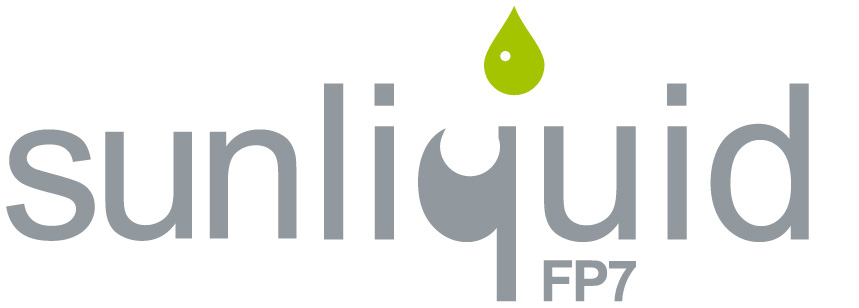
SUNLIQUID

Cellulosic ethanol made from agricultural residues
In 2015, over one fourth of the GHG emissions in the EU occurred in the transport sector. At the same time, the high worldwide growth of this sector causes a significant increase of fuel demand and CO2 emissions. Moreover, transport-generated CO2 emissions are also regarded as one of the causes of global warming. Advanced biofuels such as cellulosic ethanol could make a substantial contribution to achieve the EU’s objectives to decarbonize transportation. The EU has adopted a number of directives for a mandatory use of biofuels. The “Renewable Energy Directive” (RED) was succeeded by the “Renewable Energy Directive II” (RED II) in June 2018, stipulating a binding renewable energy target of 32 % for the EU for 2030 as well as 14 % for renewables in the transport sector by 2030. Besides, RED II demands a mandatory advanced biofuel blending mandate for all EU Member States increasing over the years, starting at 0.2 % in 2022, 1 % in 2025 and up to 3.5 % in 2030.
Cellulosic ethanol is an advanced biofuel made from agricultural residues such as wheat straw and corn stover. As yet, the main challenge was to develop a cellulosic ethanol process that is technologically highly performant and at the same time economically profitable. The innovative sunliquid® technology developed by Clariant Produkte (Deutschland) GmbH, the coordinator of the EU-funded project SUNLIQUID (“sunliquid® large scale demonstration plant for the production of cellulosic ethanol”), has overcome this challenge and meets all the requirements of a technically and economically efficient process for converting agricultural residues into climate-friendly biofuel. The process makes use of currently underutilized non-food biomass and converts the difficult to access C5 and C6 sugars contained in the stems almost entirely into ethanol. The resources used do not compete with food and feed crops, but are created in sufficient quantities worldwide as a by-product of current agricultural practice. Another major advantage of this technology: up to 95 % of CO2 emissions can be saved compared to fossil fuels when used as transportation fuel.
In support of demonstrating the technological feasibility and competitiveness of the sunliquid® process for the production of cellulosic ethanol from agricultural residues at commercial scale, the EU project SUNLIQUID receives a contribution of EUR 23 million from the European Union’s Seventh Framework Programme (FP7) under Grant Agreement no. 322386 from April 2014 to July 2022. The project could make a substantial contribution to a more sustainable energy system in the European transport sector.
Project Overview
Project aims and fields of work
First-of-its kind pre-commercial cellulosic ethanol plant
The sunliquid® technology is an innovative, breakthrough technology made in Bavaria. The technological challenges have been solved, and the next step to allow broad implementation is commercial scale production.
The SUNLIQUID consortium aims to confirm the technical and economic benefits of the large scale production of cellulosic ethanol from agricultural residues in Europe. This, in turn, will contribute to a more sustainable energy system in Europe and help to achieve the EU Commission´s goals in terms of greenhouse gas emission savings.
The main objectives of the SUNLIQUID project are:
- Carry out a detailed site selection process for the cellulosic ethanol plan
- Establish a highly efficient feedstock supply and logistics system
- Contracting local farmers and logistic providers for straw supply, transportation and storage
- Implementing a highly efficient and chemical-free pre-treatment system for feedstock
The benefits of SUNLIQUID for the European society are:
- Significant contribution to reducing greenhouse gas emissions and mitigating climate change
- Creation of green jobs, especially in rural areas
- Boost of local economies and creation of additional business opportunities
- Extension of current biofuel production to new, currently underutilized non-food biomass
- Improvement of overall performance and sustainability of biofuels
- Stimulation of wide-spread implementation of cellulosic ethanol in the EU
- Creation of a sustainable and competitive source of domestic renewable energy for the EU
- Support of the transformation from a fossil-based economy to a bio-based, circular economy
Target groups
SUNLIQUID’s project results are relevant to the following stakeholders:
- Scientific community in the areas of renewable energy, second-generation biofuels and biotechnology
- Industry and associations in the fields of biotechnology, bioethanol and biofuel production as well as biomass production and conversion
- Car manufacturers, transportation sector
- Political decision-makers
- Interested public and end-users
SUNLIQUID will disseminate its findings to these target groups through a project website, target-group specific information material, presentations at events, key conferences and workshops, parliamentary evenings, scientific publications, press activities as well as e-newsletters.
BayFOR as a partner
The Bavarian Research Alliance has intensively supported SUNLIQUID from the development of the EU application until the start of the project in April 2014. In close cooperation with the coordinator, BayFOR helped to prepare the contents of the application, especially the “impact” and “implementation” parts. BayFOR also assisted the project partners with their budget calculation and prepared the draft of the consortium agreement.
As a project partner, BayFOR is the leader of the work package “Dissemination and Stakeholder Interaction” and, as such, is responsible for all project-related press and public relations activities. The main task is to disseminate the project results and to communicate them to the defined target groups. Furthermore, BayFOR regularly provides information and consultancy to the whole consortium regarding additional international, European and national funding possibilities.
Funding
From April 2014 to July 2022, SUNLIQUID receives a funding of € 23 million from the European Union under grant agreement number 322386.
Consortium
Under the coordination of Clariant Produkte (Deutschland) GmbH, five other companies and research institutes from Germany, Austria, Hungary and Romania are participating in SUNLIQUID. The expertise offered by the SUNLIQUID consortium covers the entire value chain required to manufacture cellulosic ethanol – from feedstock sourcing to product marketing.
The participating partner institutions are:
Clariant Produkte (Deutschland) GmbH
Clariant Products Ro SRL
Energy Institute at the Johannes Kepler University Linz (EI)
ExportHungary
Industrielle Biotechnologie Bayern Netzwerk GmbH (IBB)
Bavarian Research Alliance GmbH (BayFOR)
Further information
Contact

Dr. Christian Librera
Vice President and Head of Business Line Biofuels & Derivatives
Clariant Produkte (Deutschland) GmbH
SUNLIQUID Coordination
Semmelweisstraße 1
82152 Planegg
Germany
Phone: +49 (0) 89 710 661 0
E-mail: contact@no-spam-pleasesunliquid-project-fp7.eu
Your contacts at BayFOR

Emmanuelle Rouard
Head of Public Relations
Phone: +49 89 9901888-111
Email: contact@sunliquid-project-fp7.eu




